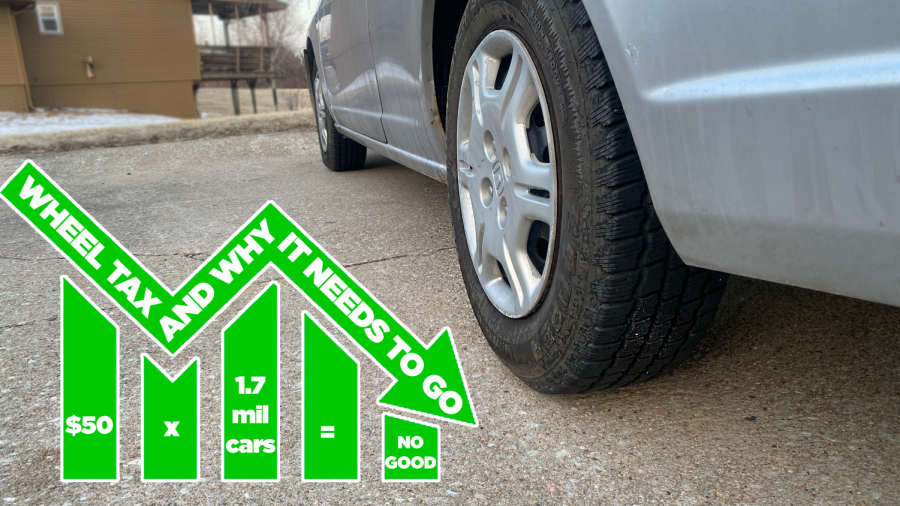A waste of $50
Why the wheel tax isn’t helping the roads
Photo created by Logan Moseley
The wheel tax is a $50 dollar tax imposed on your car when registering every year. With an estimated $860 million dollars in revenue, and no significant improvements to our roads, it’s time for the wheel tax to go.
March 28, 2023
Just a few weeks ago, I needed to renew the registration on my car. While looking at the pink receipt slip, I saw an absurd $50 dollar fee that I was unaware of the first time, the Wheel Tax. My total came up to be $92 dollars, so why dedicate over half my tab to the wheels on my car?
Passed in 2013, the goal of the Wheel Tax was to maintain public roads, however, research found has not been the case. According to Adam Wienburg, the communications director of the Platte Institute from 2014-2022, “The taxable value of your vehicle is based on its age and the original MSRP. However, the money you pay doesn’t go to as many local governments as other property taxes. Nor, surprisingly, does most of the tax go to roads. In fact, 60% of the motor vehicle tax goes to your local school district. Most of the remainder is sent to your county or city, depending on where you live.”
As many of us know, the roads in Omaha are awful. On my drive to school every morning, I face multiple potholes or arched areas on roads. In fact, back in 2013, the four way intersection of 132nd Street, Industrial road, Millard Avenue and L Street was voted as the worst intersection in America, and by a wide margin, too, and there hasn’t been construction there to improve that area in my entire life.
But what should the city of Omaha do to better our roads? In reality, shutting down half the city to improve a small section of roads is not the best idea, nor is it practical. But the city of Omaha needs to know when it is a good time to tear up the road. I live right very close to both Kiewit Middle and Cottonwood Elementary, and my brother and sister go there. What usually is an easy drive across the street from one to the other has slowly turned into a nightmare, as the one way road now has twice the traffic, and half the space. Would now be a good time to take out the only entrance to Kewit and the main exit to Cottonwood? Probably not. But over the summer when there is no school? Great timing.
The best way to tax to increase the quality of the roads is not a $50 tax on a car when registering. In the city of Omaha, there are around 1,721,519 vehicles, which would roughly equate to around $86 million dollars off of the wheel tax. With the tax being around for just about a decade, that would be an estimated total of $860 million dollars, with what seems to be next to none going to the roads. It almost seems like the wheel tax has been an unnecessary tax that only hurts the public in the first place.
So a complete elimination of the tax would seem like a good idea. But there does need to be some way to designate a tax for a faster enhancement of our roads. I would suggest an increase of something small that many are ok with. An increase of the restaurant tax, from 5.5% to around 7%, could be a good way to gain more funding for the roads, and it will be up to us to demand quicker construction on our roads.







